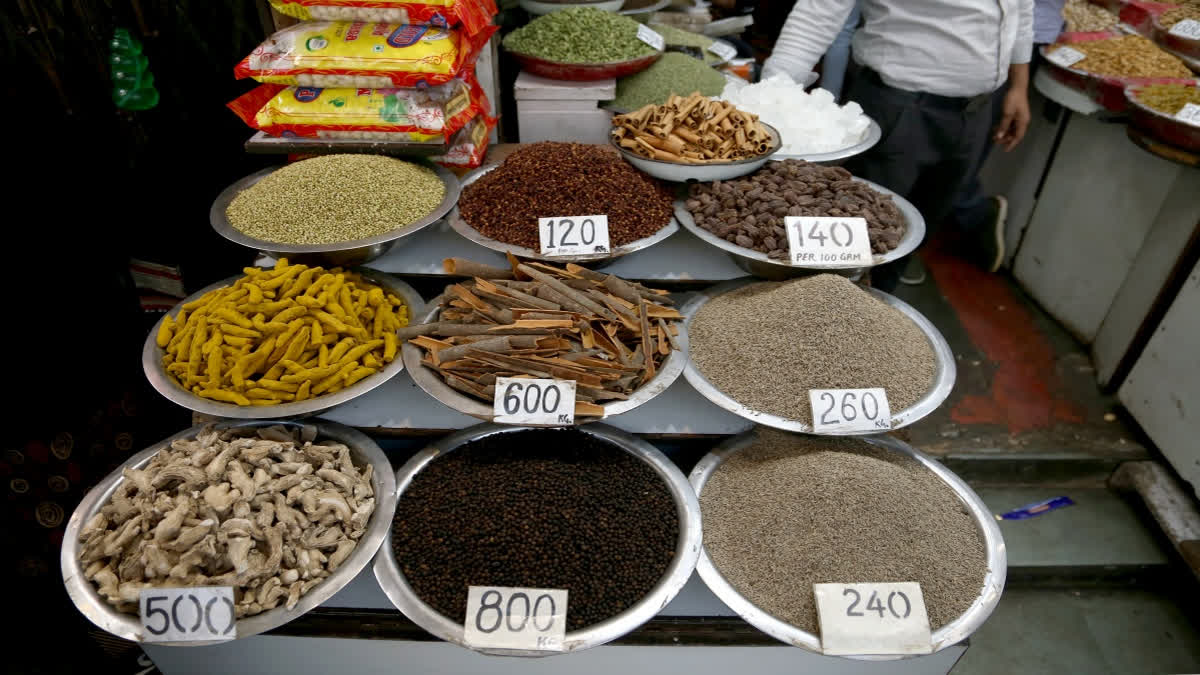New Delhi: India needs to address the quality issue with regard to its spice exports with urgency and transparency, as the ongoing quality concerns could threaten over half of the country's spice shipments, a report said on Wednesday.
Economic think tank Global Trade Research Initiative (GTRI) said that every day new countries are raising concerns about the quality of Indian spices. This issue demands urgent attention and action to uphold the storied reputation of India's fabled spice garden, it said.
"With nearly USD 700 million worth of exports to critical markets at stake, and potential losses soaring to over half of India's total spice exports due to cascading regulatory actions in many countries, the integrity and future of India's spice trade hang in delicate balance," the report said. It said India needs to address the quality issues with urgency and transparency.
"Swift investigations and the publication of findings are essential to re-establish global trust in Indian spices. Erring firms should face immediate repercussions," it added.
Hong Kong and Singapore banned the sale of popular brands MDH and Everest after detecting carcinogenic chemical ethylene oxide in their products. This led to a mandatory recall from shelves.
The primary violations in these incidents include the presence of ethylene oxide, a carcinogen used as a fumigating agent, and salmonella contamination, a common bacterial cause of foodborne illness, the report said.
"This situation could worsen if the European Union, which regularly rejects Indian spice consignments over quality issues, follows suit. An EU-wide rejection could impact an additional USD 2.5 billion, bringing the total potential loss to 58.8 per cent of India's worldwide spice exports," GTRI Co-Founder Ajay Srivastava said.
Citing certain reports, the GTRI said that the US, Hong Kong, Singapore, Australia, and now Mal have raised questions about the quality of spices supplied by leading Indian firms MDH and Everest spices. With India having exported spices valued at approximately USD 692.5 million to these countries in the fiscal year 2024, the stakes are high, Srivastava said.
"If China, influenced by actions in Hong Kong and ASEAN based on the precedents set by Singapore, decides to implement similar measures, Indian spice exports could see a dramatic downturn. The potential repercussions could affect exports valued at USD 2.17 billion, representing 51.1 per cent of India's global spice exports," he added.
Srivastava said that so far the response from Indian authorities has been tepid and formulaic. Following international criticism, both the Spices Board and the Food Safety and Standards Authority of India (FSSAI) began routine sampling, yet no definitive statements about spice quality have been issued by these or any other government agencies, he said.
"This lack of clear communication is disappointing, especially given the comprehensive laws and processes in place for quality assurance. Despite denials of any wrongdoing by major companies like MDH and Everest, their continued rejections by international bodies should have raised alarms with both the Spices Board and FSSAI much earlier," he said.
He cautioned that if the quality of products from top Indian firms is questionable, it casts doubt on the integrity of spices available in the Indian market as well. The GTRI report suggested that the overall situation calls for a fundamental shift in how India handles food safety - transparency, stringent enforcement, and clear communication are crucial to restoring and maintaining the integrity of its exports and domestic products alike.
Fundamental changes are needed in the functioning of agencies regulating quality, it added. Spices are dried parts of plants, including seeds, roots, bark, and fruits, valued for their flavours, aromas, or preservative qualities. Common examples include cloves, cinnamon, ginger, black pepper, cumin, and coriander. Spices enhance flavour, add colour, and sometimes mask undesirable odours, playing an essential role in global cuisines.
In 2023-24, India's spice exports totalled USD 4.25 billion, accounting for a 12 per cent share of the global spice exports. The major spices exported from India included chilli powder, which topped the list with USD 1.3 billion in exports, followed by cumin at USD 550 million, turmeric at USD 220 million, cardamom at USD 130 million, mixed spices at USD 110 million, and spice oils and oleoresins at USD 1 billion.
Other notable exports were asafoetida, saffron, anise, nutmeg, mace, clove, and cinnamon. On the import front, India purchased spices worth USD 1.5 billion, with the largest imports being spice oils and oleoresins at USD 354 million, cinnamon and cassia at USD 270 million, coriander and cumin at USD 210 million, nutmeg at USD 118 million, and asafoetida at USD 110 million.
The primary markets for Indian spices were China, which imported spices worth USD 928 million, the US at USD 574 million, and Bangladesh at USD 339 million. Other significant buyers included the UAE (USD 256 million), Thailand (USD 193 million), Malaysia (USD 147 million), Indonesia (USD 137 million), UK (USD 122 million), Australia (USD 63 million), Singapore (USD 50 million), Hongkong (USD 5.5 million).
The world spice trade is worth USD 35 billion in 2023. China is the top exporter with exports of USD 8 billion in 2023. Top exports are chilli powder (USD 2.4 billion), ginger, turmeric (USD 2.2 billion), garlic fresh and dried (USD 1.6 billion), coriander, and cumin seeds (USD 800 million), according to the GTRI.
Read More



